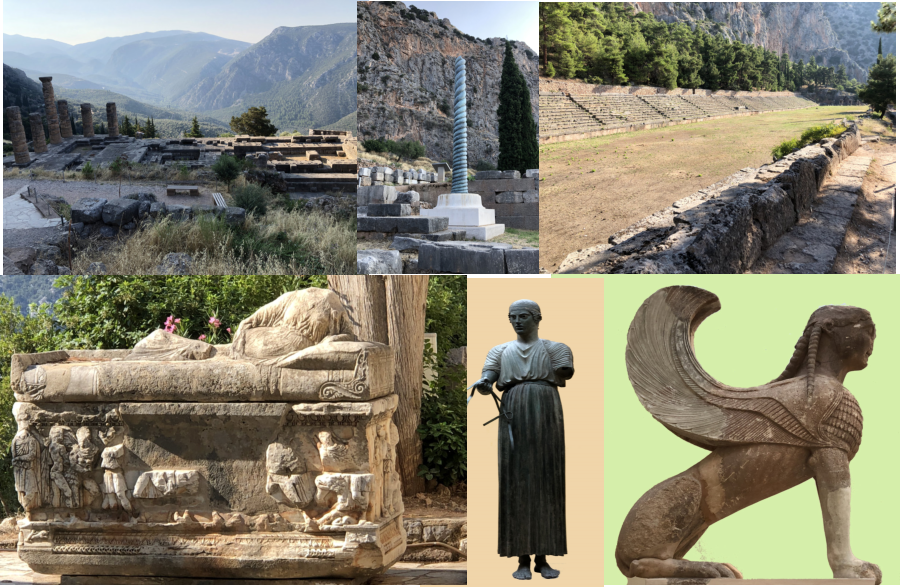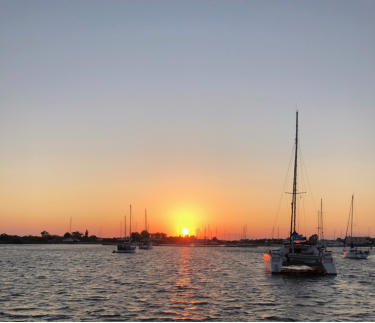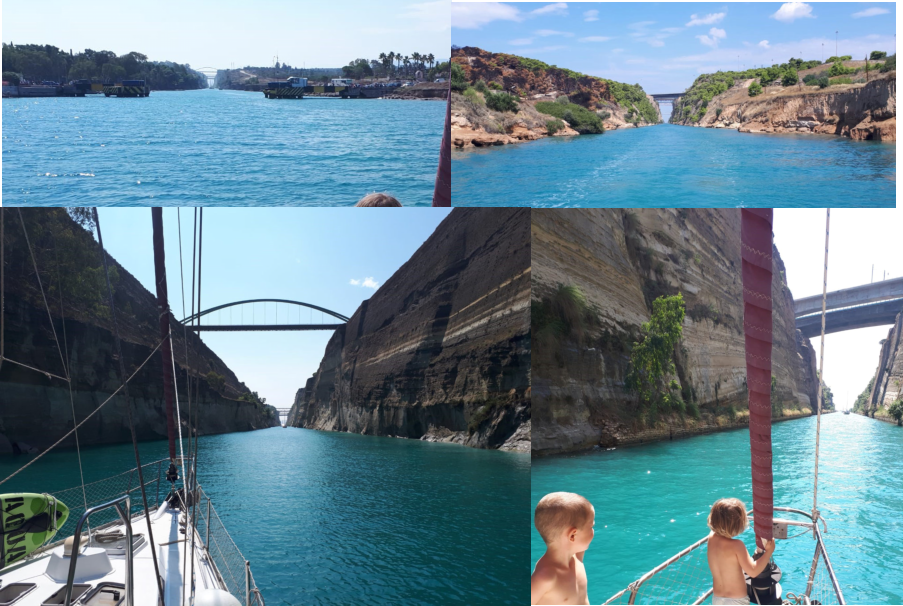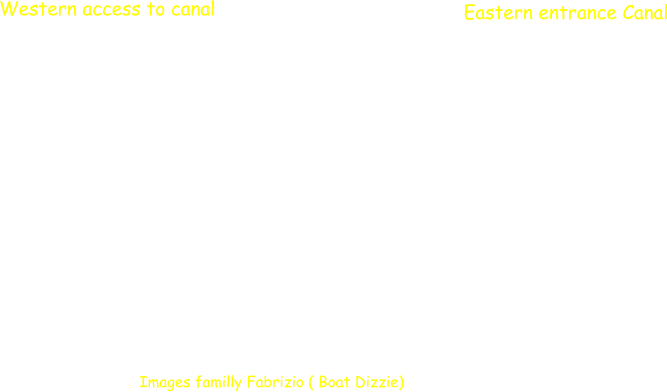

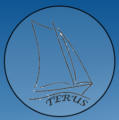









Our Journey: 2018
Gulf of Corinth: (June 2018)
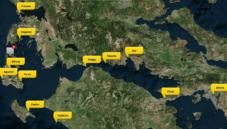
The Corinth gulf between the Greek continent and the island of the Peloponnese is about 90 miles long and 12 miles at its widest point At both ends of the Gulf there are important
miles long and 12 miles at its widest point At both ends of the Gulf there are important engineering works that today attract a lot of people. On the West side is the Rion-Antonion
engineering works that today attract a lot of people. On the West side is the Rion-Antonion suspension bridge. This bridge is 2,250 meters long and is supported by 4 pillars 660 meters
suspension bridge. This bridge is 2,250 meters long and is supported by 4 pillars 660 meters apart. When it was inaugurated, in August 2004, it was the longest suspension bridge in the
apart. When it was inaugurated, in August 2004, it was the longest suspension bridge in the world, but 4 month later it was beaten by the French bridge at Millau with a span of 2,460
world, but 4 month later it was beaten by the French bridge at Millau with a span of 2,460 meters. Despite this it is still a very impressive bridge as numerous challenges needed to be
meters. Despite this it is still a very impressive bridge as numerous challenges needed to be addressed. The bridge connects two tectonic plates that move apart by several mm every year.
addressed. The bridge connects two tectonic plates that move apart by several mm every year. It is placed on a bottom of bad quality so special techniques had to be invented to ensure the
It is placed on a bottom of bad quality so special techniques had to be invented to ensure the pillars do not move. The depth of at the bottom is 60 meters, which is also unique. The bridge
pillars do not move. The depth of at the bottom is 60 meters, which is also unique. The bridge is ready to withstand an earthquake of force 7 on the Richter scale and can be hit by a tanker
is ready to withstand an earthquake of force 7 on the Richter scale and can be hit by a tanker of 180,000 tons cruising at a speed of 30km/h. Lastly, the bridge is able to cope with winds of
of 180,000 tons cruising at a speed of 30km/h. Lastly, the bridge is able to cope with winds of up to 180 km/h.
up to 180 km/h.
 Today the bridge is impressive and can be seen from far away. One often encounters currents
Today the bridge is impressive and can be seen from far away. One often encounters currents of up to 3 knots and to go under the bridge, every boat must request permission by VHF. At
of up to 3 knots and to go under the bridge, every boat must request permission by VHF. At the other end of the Gulf is the Corinth Canal. It is an artificial waterway built to avoid going
the other end of the Gulf is the Corinth Canal. It is an artificial waterway built to avoid going around the Peloponnese Islands. The first attempt to build a canal here was in 69 BC when the
around the Peloponnese Islands. The first attempt to build a canal here was in 69 BC when the Roman emperor Nero started the construction. But works were suspended when he died. The
Roman emperor Nero started the construction. But works were suspended when he died. The construction of the current canal was initiated in 1882 and in 1893 the canal was inaugurated.
construction of the current canal was initiated in 1882 and in 1893 the canal was inaugurated. Today, more than 11,.000 boats, mostly leisure craft and small cargo ships pass through the
Today, more than 11,.000 boats, mostly leisure craft and small cargo ships pass through the canal. The dimensions of the canal are 6,343 meters in length, 24 meters in width and 8 meters
canal. The dimensions of the canal are 6,343 meters in length, 24 meters in width and 8 meters in depth. Along some of it the cliffs are very high, 52 meters in height. Terus did not go
in depth. Along some of it the cliffs are very high, 52 meters in height. Terus did not go through the canal as it is quite expensive (300euro). We will pass through it later when we have
through the canal as it is quite expensive (300euro). We will pass through it later when we have a good reason to do so. The real reason why we went into the Gulf of Corinth was that we
a good reason to do so. The real reason why we went into the Gulf of Corinth was that we wanted to visit the ruins of Delphi. The site dates from the 6 century BC and according to the
wanted to visit the ruins of Delphi. The site dates from the 6 century BC and according to the legend, it was selected by Zeus who decided that it was the navel of the earth. The oracles of
legend, it was selected by Zeus who decided that it was the navel of the earth. The oracles of Apollo were also issued there. Needless to say, in those days it was a sacred place. The ruins
Apollo were also issued there. Needless to say, in those days it was a sacred place. The ruins still demonstrate how much the site was venerated. The backdrop to the site is very beautiful
still demonstrate how much the site was venerated. The backdrop to the site is very beautiful with mount Parnassus reaching to a height of 2,457 meters. I recommend that you visit the
with mount Parnassus reaching to a height of 2,457 meters. I recommend that you visit the site early in the morning when it opens. At that time the sun is still behind the mountain and
site early in the morning when it opens. At that time the sun is still behind the mountain and the temperature is very pleasant. Once you have visited the ruins you can go to the museum
the temperature is very pleasant. Once you have visited the ruins you can go to the museum that contains a lot of beautiful artefacts. The majority of tourist will arrive when you get
that contains a lot of beautiful artefacts. The majority of tourist will arrive when you get 
 to the museum. The site is classified as a world heritage center. While travelling in the Gulf we
to the museum. The site is classified as a world heritage center. While travelling in the Gulf we really appreciated two places: the island of Trizonia, a small island that lives thanks to the
really appreciated two places: the island of Trizonia, a small island that lives thanks to the pleasure yachts. A few restaurants cater to visitors. When we were there, the harbor was free
pleasure yachts. A few restaurants cater to visitors. When we were there, the harbor was free but today the authorities have decide to clean the harbor and remove a big wreck that has
but today the authorities have decide to clean the harbor and remove a big wreck that has been there for more than 10 years. They will no longer allow boats to stay for free, either. We
been there for more than 10 years. They will no longer allow boats to stay for free, either. We hope the rates will be reasonable so that the place remains attractive. We also like the harbor
hope the rates will be reasonable so that the place remains attractive. We also like the harbor of Missolonghi. It is located on the west side of the Gulf before the suspension bridge. This
of Missolonghi. It is located on the west side of the Gulf before the suspension bridge. This place is located in a vast Laguna and you need to follow the channel marked by buoys to reach
place is located in a vast Laguna and you need to follow the channel marked by buoys to reach the jetty. The place is very quiet and little cargo boats only arrive once and a while. There are
the jetty. The place is very quiet and little cargo boats only arrive once and a while. There are no cranes or other heavy equipment in the harbor. Pleasure yachts can for a small fee tie up to
no cranes or other heavy equipment in the harbor. Pleasure yachts can for a small fee tie up to the jetty, or else they can drop anchor and stay free of charge for several days. A lot of
the jetty, or else they can drop anchor and stay free of charge for several days. A lot of turtles come up to the surface to breath and in the evening you can see a lot of fish jumping
turtles come up to the surface to breath and in the evening you can see a lot of fish jumping out of the water. Due to the turtles and the presence of birds in the Laguna it is now a
out of the water. Due to the turtles and the presence of birds in the Laguna it is now a naturalreserve. You can find a marina at Missolonghi, that is now open. In the city there is a
naturalreserve. You can find a marina at Missolonghi, that is now open. In the city there is a statue of the English poet, Lord Byron. The statue reminds visitors that he died in Missolonghi
statue of the English poet, Lord Byron. The statue reminds visitors that he died in Missolonghi in 1824. Lord Byron is well known as the poet who wrote “Don Juan.”
in 1824. Lord Byron is well known as the poet who wrote “Don Juan.”

 miles long and 12 miles at its widest point At both ends of the Gulf there are important
miles long and 12 miles at its widest point At both ends of the Gulf there are important engineering works that today attract a lot of people. On the West side is the Rion-Antonion
engineering works that today attract a lot of people. On the West side is the Rion-Antonion suspension bridge. This bridge is 2,250 meters long and is supported by 4 pillars 660 meters
suspension bridge. This bridge is 2,250 meters long and is supported by 4 pillars 660 meters apart. When it was inaugurated, in August 2004, it was the longest suspension bridge in the
apart. When it was inaugurated, in August 2004, it was the longest suspension bridge in the world, but 4 month later it was beaten by the French bridge at Millau with a span of 2,460
world, but 4 month later it was beaten by the French bridge at Millau with a span of 2,460 meters. Despite this it is still a very impressive bridge as numerous challenges needed to be
meters. Despite this it is still a very impressive bridge as numerous challenges needed to be addressed. The bridge connects two tectonic plates that move apart by several mm every year.
addressed. The bridge connects two tectonic plates that move apart by several mm every year. It is placed on a bottom of bad quality so special techniques had to be invented to ensure the
It is placed on a bottom of bad quality so special techniques had to be invented to ensure the pillars do not move. The depth of at the bottom is 60 meters, which is also unique. The bridge
pillars do not move. The depth of at the bottom is 60 meters, which is also unique. The bridge is ready to withstand an earthquake of force 7 on the Richter scale and can be hit by a tanker
is ready to withstand an earthquake of force 7 on the Richter scale and can be hit by a tanker of 180,000 tons cruising at a speed of 30km/h. Lastly, the bridge is able to cope with winds of
of 180,000 tons cruising at a speed of 30km/h. Lastly, the bridge is able to cope with winds of up to 180 km/h.
up to 180 km/h.
 Today the bridge is impressive and can be seen from far away. One often encounters currents
Today the bridge is impressive and can be seen from far away. One often encounters currents of up to 3 knots and to go under the bridge, every boat must request permission by VHF. At
of up to 3 knots and to go under the bridge, every boat must request permission by VHF. At the other end of the Gulf is the Corinth Canal. It is an artificial waterway built to avoid going
the other end of the Gulf is the Corinth Canal. It is an artificial waterway built to avoid going around the Peloponnese Islands. The first attempt to build a canal here was in 69 BC when the
around the Peloponnese Islands. The first attempt to build a canal here was in 69 BC when the Roman emperor Nero started the construction. But works were suspended when he died. The
Roman emperor Nero started the construction. But works were suspended when he died. The construction of the current canal was initiated in 1882 and in 1893 the canal was inaugurated.
construction of the current canal was initiated in 1882 and in 1893 the canal was inaugurated. Today, more than 11,.000 boats, mostly leisure craft and small cargo ships pass through the
Today, more than 11,.000 boats, mostly leisure craft and small cargo ships pass through the canal. The dimensions of the canal are 6,343 meters in length, 24 meters in width and 8 meters
canal. The dimensions of the canal are 6,343 meters in length, 24 meters in width and 8 meters in depth. Along some of it the cliffs are very high, 52 meters in height. Terus did not go
in depth. Along some of it the cliffs are very high, 52 meters in height. Terus did not go through the canal as it is quite expensive (300euro). We will pass through it later when we have
through the canal as it is quite expensive (300euro). We will pass through it later when we have a good reason to do so. The real reason why we went into the Gulf of Corinth was that we
a good reason to do so. The real reason why we went into the Gulf of Corinth was that we wanted to visit the ruins of Delphi. The site dates from the 6 century BC and according to the
wanted to visit the ruins of Delphi. The site dates from the 6 century BC and according to the legend, it was selected by Zeus who decided that it was the navel of the earth. The oracles of
legend, it was selected by Zeus who decided that it was the navel of the earth. The oracles of Apollo were also issued there. Needless to say, in those days it was a sacred place. The ruins
Apollo were also issued there. Needless to say, in those days it was a sacred place. The ruins still demonstrate how much the site was venerated. The backdrop to the site is very beautiful
still demonstrate how much the site was venerated. The backdrop to the site is very beautiful with mount Parnassus reaching to a height of 2,457 meters. I recommend that you visit the
with mount Parnassus reaching to a height of 2,457 meters. I recommend that you visit the site early in the morning when it opens. At that time the sun is still behind the mountain and
site early in the morning when it opens. At that time the sun is still behind the mountain and the temperature is very pleasant. Once you have visited the ruins you can go to the museum
the temperature is very pleasant. Once you have visited the ruins you can go to the museum that contains a lot of beautiful artefacts. The majority of tourist will arrive when you get
that contains a lot of beautiful artefacts. The majority of tourist will arrive when you get 
 to the museum. The site is classified as a world heritage center. While travelling in the Gulf we
to the museum. The site is classified as a world heritage center. While travelling in the Gulf we really appreciated two places: the island of Trizonia, a small island that lives thanks to the
really appreciated two places: the island of Trizonia, a small island that lives thanks to the pleasure yachts. A few restaurants cater to visitors. When we were there, the harbor was free
pleasure yachts. A few restaurants cater to visitors. When we were there, the harbor was free but today the authorities have decide to clean the harbor and remove a big wreck that has
but today the authorities have decide to clean the harbor and remove a big wreck that has been there for more than 10 years. They will no longer allow boats to stay for free, either. We
been there for more than 10 years. They will no longer allow boats to stay for free, either. We hope the rates will be reasonable so that the place remains attractive. We also like the harbor
hope the rates will be reasonable so that the place remains attractive. We also like the harbor of Missolonghi. It is located on the west side of the Gulf before the suspension bridge. This
of Missolonghi. It is located on the west side of the Gulf before the suspension bridge. This place is located in a vast Laguna and you need to follow the channel marked by buoys to reach
place is located in a vast Laguna and you need to follow the channel marked by buoys to reach the jetty. The place is very quiet and little cargo boats only arrive once and a while. There are
the jetty. The place is very quiet and little cargo boats only arrive once and a while. There are no cranes or other heavy equipment in the harbor. Pleasure yachts can for a small fee tie up to
no cranes or other heavy equipment in the harbor. Pleasure yachts can for a small fee tie up to the jetty, or else they can drop anchor and stay free of charge for several days. A lot of
the jetty, or else they can drop anchor and stay free of charge for several days. A lot of turtles come up to the surface to breath and in the evening you can see a lot of fish jumping
turtles come up to the surface to breath and in the evening you can see a lot of fish jumping out of the water. Due to the turtles and the presence of birds in the Laguna it is now a
out of the water. Due to the turtles and the presence of birds in the Laguna it is now a naturalreserve. You can find a marina at Missolonghi, that is now open. In the city there is a
naturalreserve. You can find a marina at Missolonghi, that is now open. In the city there is a statue of the English poet, Lord Byron. The statue reminds visitors that he died in Missolonghi
statue of the English poet, Lord Byron. The statue reminds visitors that he died in Missolonghi in 1824. Lord Byron is well known as the poet who wrote “Don Juan.”
in 1824. Lord Byron is well known as the poet who wrote “Don Juan.”

